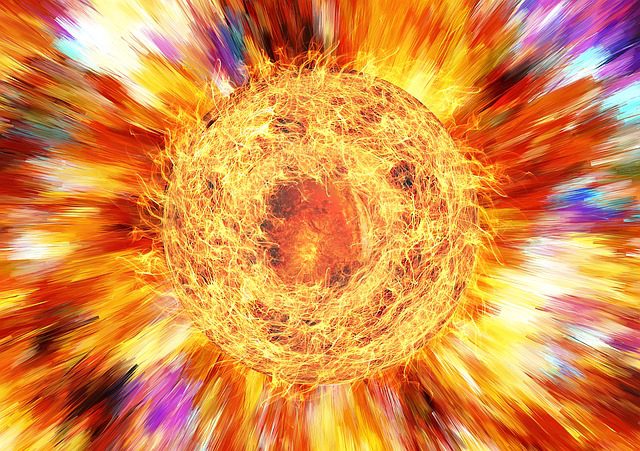
“Anthrotheist” commented in the combox of my post, Dialogue w Atheist on the Origin of the Universe. His words will be in blue.
*****
I can’t help but feel like there is still a “God of the gaps” in effect here.
Of course. I think it’s because that is the stock response of lots of atheists, whenever we dare bring up God at all. Since you guys think He is nonexistent and belief in Him the equivalent of belief in leprechauns and Santa Claus, if we mention Him there has to be some way to dismiss it altogether, and that is usually good ol’ “God of the gaps.” You don’t acknowledge that belief in God can explain anything.
Because theism is not a scientific explanation, you assume it is somehow “anti-science”: thus, the knee-jerk “God of the gaps” objection, which basically is intended to shut down further discussion, since the theist is wrongly thought to be relying on mere silliness and an anti-scientific attitude (which in turn precludes serious discussion, for the materialistic, science-only-sort of person). But honing in on the limitations of science is not anti-science at all.
We could just as easily say that you guys simply substitute the goddess of Time (give it enough time and anything whatever can occur) or the atom-gods: which possess all the remarkable creative and organizational abilities that we ascribe to God, and for no more discernible scientifically established reason than we can attribute to God. I don’t see all that much difference, in an epistemological sense. Both sides must appeal (for lack of any better idea) to notions that are outside of the scientific purview. And that’s okay, and fully to be expected, because science is not the entire sum of human knowledge in the first place.
And in that context of equally nonexistent answers and reasons (from a strictly scientific, empirical perspective), we think God is more plausible as the candidate for having godlike qualities than the atom (or, sub-atomic particles, as it were). That’s not merely “god of the gaps”; rather, it is part and parcel of the serious, respectable philosophical worldview of theism.
It is true that there is no current scientific theory that explains either how life can originate from non-life, or how life did originate from non-life.
I don’t see why there cannot be an understood “yet” at the end of this statement.
There could be, but the problem is that it seems to be an indefinite “yet.” Oftentimes, this mindset is of the danging a carrot: always there, but inevitably out of reach. I often think of scientists, say, 50 years ago, in 1968 and a scenario in which they were asked, “do you think that, 50 years from now, we will have a plausible explanation of a materialistic evolution of life from non-life, and/or proof of extraterrestrial life?” I would venture to guess that some 90% of them would say that one or both of those things would surely have occurred by now. It’s obvious in scientific rhetoric that the explanation or discovery is often widely assumed to be just around the corner.
So it becomes a technique itself (and not a particularly impressive one). They casually assume that science can, or one day will, be able to explain anything whatever (which is a very questionable assumption), because they think matter and time and chance / probability can explain anything (making those three things gods), and because they rule out any possible theistic explanation or the possibility that maybe God didn’t want life anywhere but on earth: that life and human beings indeed are unique in the universe.
On the other hand, if such life is discovered, it doesn’t disprove God in the slightest (even though many will say that it does, just as they have fallaciously done with evolution for over 150 years. Christians like C. S. Lewis have already written about this possibility (as I have myself). Life somewhere else doesn’t “prove” that it could come about through solely materialistic processes, anymore than life on earth has proven that. Scientists don’t have the slightest clue how it supposedly happened. But they will!, they will!, they will! ad infinitum . . .
We didn’t have a scientific theory of most diseases before germ theory, nor any scientific explanation for the diversity of life before the theory of evolution.
The problem is not simply admitting that we don’t know something (scientifically). The problem is that God can never be proposed as the explanation for anything. I agree that Christians have been quick to credit God with what was merely natural; but atheists have also been quick to deny that God could do anything. I find both things equally closed-minded and unreasonable.
This to me is the larger point: looking at a difficult question, one that seems insurmountable, and saying “God did it” doesn’t get you anywhere.
It doesn’t scientifically, because that’s not scientific method. But it can go quite a ways in philosophy and theology: which don’t have the pretense of claiming that their own field of knowledge is the only one that exists.
At best, it pushes the quest for knowledge to the fringes of society to be conducted in secluded and cloistered institutions in relative obscurity (and only indirectly funded by organizations with resources to spare);
If that’s what you call philosophy and theology (mathematics and logic are not empirical, either) . . . I don’t. I think they are fields just as valuable and productive and worthy of respect as science. And once again you simply exhibit your extreme bias and prejudice against non-scientific (not unscientific or anti-scientific! )thinking.
at worst, it produces an attempt at an epistemology derived from forgone conclusions like “Intelligent Design” (i.e., re-branded Creationism).
Intelligent design is not necessarily creationism. Richard Dawkins stated in his book that microbiologist Michael Behe was a creationist. He’s not. He is a theistic evolutionist, as he has clearly stated. But he thinks that materialistic processes cannot adequately explain the complexity of even microbiology alone. He thinks a Designer is required. So do I. And so have great philosophical minds like David Hume (who was not an atheist, and believed in a form of the teleological argument). Einstein was not a theist, but he thought it self-evident that there was a wonder and beauty and (if you will) design to the universe that atheism couldn’t come close to explaining. He didn’t try to explain it by science alone, because he knew that was foolish. And this sense was what he called his own “religion.”
You want to talk about “foregone conclusions”? I have already noted some of your own:
1) Life must have evolved from non-life, by materialistic processes.
2) The universe must have come about by purely materialistic processes, based on the potentialities of matter, which originated who knows how?
3) God and His attributes couldn’t possibly have been the explanation of either of those origins.
We have our beliefs (and reasons for them): “God did it.” You have yours (and no good or plausible reasons for them, that I can see): “God could not possibly have done it.” I don’t see a helluva lot of difference between the two belief-system in this regard. We both accept axioms that have not been demonstrated and quite likely could not be explained or will not ever in fact be fully explained.
I’ve been contemplating a thought experiment for a little while now, maybe a charitable reader of these conversations could provide some feedback.
I will do so (at least partially) myself!
The premise is simple enough: to the degree which it is possible, describe what you would expect a universe to look like if you accept the assumption that the opposite to your belief were true. If you believe in God, imagine a purely material universe;
I think it would be chaotic and that the laws of science would not be what we now observe, because they never would have evolved. Life wouldn’t have evolved because there seems to be no way (by our present knowledge) for it to do so. It’s simply too wonderful and complex to be explained solely by matter, time, and chance. Or, perhaps more likely (since we still have to explain the origin of mater itself), there would be nothing at all.
if you believe in no god, imagine a universe created by God.
I look forward to seeing what atheists say to that. It could be quite entertaining. If they said, “it would look like the world we live in now” then they would have to immediately become a theist. :-)
If possible, accept that there are human beings in the imagined world; that is, by some means human beings have managed to come into existence and survived to the point where this conversation is taking place. How similar could the universe be to your understanding of our actual world and what would have to be different?
I think in that world, the human beings would have no final purpose or meaning to life; no ethics. It would be a terrible world, much like the “worlds” we see in societies that tried to reject Christianity and/or God altogether (Stalin’s Soviet Union, Mao’s China; Hitler’s Germany). I think the good things ultimately derive from a good God, whether folks are aware of it or not.
What would have to be true for it to exist opposite to your beliefs, and what would have to be true for us to exist here as we sit?
That’s the far more interesting question. I would have to be shown that 1) the world can possibly be explained solely through materialistic processes, and 2) that all the arguments for God clearly fail, and 3) that Jesus didn’t exist and the Bible was just a sham.
Since none of those things have remotely been done, I don’t think I’m in any danger of forsaking Christianity or God anytime soon.
I shall end with Christian philosopher Alvin Plantinga’s observation that “God-of-the-gaps theology” is not a thing which many serious, thinking Christians would ever adopt in the first place (i.e., it’s a caricature of what Christians believe, and so a straw man):
God-of-the-gaps theology. . . is at best a kind of anemic and watered-down semideism that inserts God’s activity into the gaps in scientific knowledge; it is associated, furthermore, with a weak and pallid apologetics according to which perhaps the main source or motivation for belief in God is that there are some things science cannot presently explain. A far cry indeed from what the Scriptures teach! God-of-the-gaps theology is worlds apart from serious Christian theism. This is evident at (at least) the following points. First and most important, according to serious theism, God is constantly, immediately, intimately, and directly active in his creation: he constantly upholds it in existence and providentially governs it. He is immediately and directly active in everything from the Big Bang to the sparrow’s fall. Literally nothing happens without his upholding hand.
Second, natural laws are not in any way independent of God, and are perhaps best thought of as regularities in the ways in which he treats the stuff he has made, or perhaps as counterfactuals of divine freedom. (Hence there is nothing in the least untoward in the thought that on some occasions God might do something in a way different from his usual way- e.g., raise someone from the dead or change water into wine.) Indeed, the whole interventionist terminology- speaking of God as intervening in nature, or intruding into it, or interfering with it, or violating natural law- all this goes with God-of-the-gaps theology, not with serious theism. According to the latter, God is already and always intimately acting in nature, which depends from moment to moment for its existence upon immediate divine activity; there is not and could not be any such thing as his intervening in nature.
These are broadly speaking metaphysical differences between Christian theism and God-of-the-gaps thought; but there are equally significant epistemological differences. First, the thought that there is such a person as God is not, according to Christian theism, a hypothesis postulated to explain something or other, nor is the main reason for believing that there is such a person as God the fact that there are phenomena that elude the best efforts of current science. Rather, our knowledge of God comes by way of general revelation, which involves something like Aquinas’s general knowledge of God or Calvin’s sensus divinitatis, and also, and more importantly, by way of God’s special revelation, in the Scriptures and through the church, of his plan for dealing with our fall into sin. . . .
Serious Christians should indeed resolutely reject this way of thinking. The Christian community knows that God is constantly active in his creation, that natural laws, if there are any, are not independent of God, and that the existence of God is certainly not a hypothesis designed to explain what science cannot. Furthermore, the Christian community begins the scientific enterprise already believing in God; it does not (or at any rate need not) engage in it for apologetic reasons, either with respect to itself or with respect to non-Christians. (“Methodological Naturalism”: Perspectives on Science and Christian Faith 49 [September 1997]: 143-154)
*****
Photo credit: “Big Bang” image [Max Pixel / Creative Commons Zero – CC0. license]
*****












